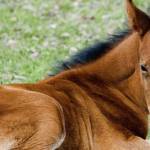Colic in Foals

Your new arrival seemed bright on delivery, but a couple days later that fuzzy foal is on the ground, rolling and displaying clinical signs associated with colic in adult horses…but could it be?
Colic, a general term that describes abdominal discomfort, can affect horses of all ages, even the very young.
First Days
Foals in their first few days of life may be affected by several issues that can cause colic.
Meconium: the type of feces a foal produces while still in the womb, before it begins consuming milk. Meconium can be very dense and sticky, and impactions are not uncommon. Enemas of soapy water will typically resolve the impaction, and surgery is rarely required.
Congenital abnormalities: some foals are born without fully formed gastrointestinal tracts or with faulty nervous systems unable to trigger the muscles to expel feces. There are no treatment options for these foals.
Ruptured bladder: thought to be the result of foaling difficulties. This occurs more frequently in male foals and requires prompt treatment to prevent leaking urine from elevating potassium levels in the blood, which can lead to cardiac arrest. Once the foal is stabilized, surgery to repair the bladder is necessary.
Older Foals
Other issues can strike foals of all ages.
Enterocolitis: this can be caused by bacterial, viral, or parasitic organisms, or other noninfectious causes, and affects foals at various stages of development. Diarrhea in foals should be considered an emergency, as foals can deteriorate very quickly and die from dehydration or low blood sugar. Foals with diarrhea may also be predisposed to intussusception, which occurs when the intestine slides over itself.
Gastric ulcers: these most often occur in stressed foals, such as those that are sick and undergoing treatment, or those that are held off milk. In foals, ulcers can also occur in the outflow tract of the stomach, where scar tissue might cause strictures. Foals with ulcers might grind their teeth or rest on their backs with their legs in the air for extended periods of time.
Roundworms: these internal parasites can obstruct the small intestine if older weanlings are not dewormed appropriately.
Colic in foals should be considered an emergency and addressed quickly. Ask your veterinarian before administering any medications to foals.








